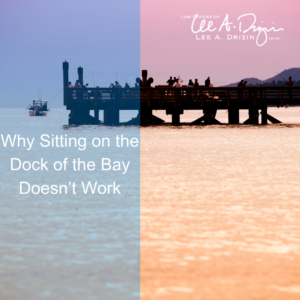Why Sitting on the Dock of the Bay Doesn’t Work
“Dock of the Bay” was based on an inspiration the great Otis Redding came up with during the time he spent sitting and watching the ocean in California. The lyrics have been described as an attempt to find beauty in life despite the despair you may have encountered. Understandably, dealing with the death of a loved one is so overwhelming for some people that they can’t bring themselves to address the decedent’s financial affairs. Unfortunately, that is rarely the best way to handle an estate. While contemplating your loss is an important part of the grieving process, undue delays in moving forward with the probate process can make a difficult situation worse.

Understanding the probate process.
Probate is the legal procedure your estate goes through after you pass away. During this legal proceeding, a court will oversee the process of appointing someone to be in charge (known as the “personal representative”), ensuring creditors of the decedent who file timely claims are paid and the assets of the estate are distributed to the proper heirs or beneficiaries.
Myths about probate.
There’s a misunderstanding that if someone dies without a will, the State of Nevada gets everything. This is wrong and should never be a reason to avoid moving forward with the probate. If a person dies without a will he or she is said to have “died intestate.” The estate of a person who has died intestate goes through probate court and the Nevada Revised Statutes determine who will inherit your assets.
When there’s no surviving spouse, the assets of the estate are distributed between the surviving children and predeceased children survived by children, in equal shares. Another reason that someone may not probate an estate is that they believe the attorney’s fees will eat up the estate. However, attorney’s fees are generally less than five percent (5%) of the value of the estate.
Business as usual is a bad solution with real estate.
When a surviving parent dies and an adult child takes over the mortgage payments and moves into or rents out their parent’s home, disastrous results can occur. Typically, when a mortgaged property transfers ownership, a due-on-sale clause, or alienation clause, requires that the full loan amount be repaid right away. However, there are laws in place to protect certain heirs that allow them to take over the title of the home (meaning that they’re the legal owner of the home) without triggering the due-on-sale clause.
If you don’t fall into this category, you will encounter problems because you’re not the legal owner of the property. It could give rise to tax issues if you attempt to deduct the mortgage payments you make. In addition, you don’t have the authority to rent out the property since you aren’t the owner. More importantly, when you want to sell the property, you will be prohibited from doing so.
The Clark County Public Administrator.
When no family member proceeds with opening a probate, a petition may be filed by the Clark County Public Administrator (the “CCPA”). The CCPA serves two important functions for residents of Clark County. The Public Administrator secures the property of people who pass away in Clark County while a search for family or the decedent’s executor is performed. The Public Administrator also administers estates in court when an otherwise legally entitled person cannot. The CCPA’s office does an excellent job (and is entitled to a fee for doing so) but the probate is now being handled by a third party and you will not be in control of how the probate proceedings are administered. Due to the volume of estates being handled by the Clark County Public Administrator, there can be significant delays.
Probate can be avoided through careful planning. However, if a loved one has passed away and probate is needed, it shouldn’t be avoided and important decisions put off. At Drizin Law, we explain the probate process in easily understandable terms and guide you step-by-step through the process. If you have questions about Nevada probate proceedings, don’t hesitate to download our eBook or contact us at (702) 798-4955.
Drizin Law is providing this information for educational purposes only. It should not be construed as legal advice or a legal opinion as to any specific facts or circumstances. This information is based on general principles of Nevada law at the time it was created and you should be aware laws frequently change. Moreover, the laws affecting you may differ depending on the circumstances. You should consult with a qualified attorney in your own state or jurisdiction concerning your particular situation. Review of this information does not create an attorney-client relationship.







